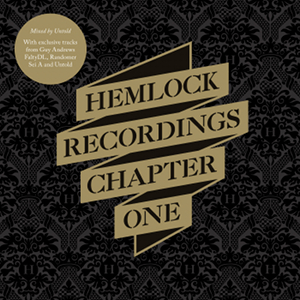Various Artists Hemlock Recordings: Chapter One
During the early months of 2009, Hemlock—the label co-founded four years ago by Jack Dunning […]

During the early months of 2009, Hemlock—the label co-founded four years ago by Jack Dunning (a.k.a. Untold)—played a pivotal role in a genuinely exciting moment in the continuum of UK dance music. As dubstep hit maturity, it created the conditions for the rise of another wave of producers working at 140 bpm, a crop of artists working with dubstep’s powerful sub-bass and sparse leanings but incorporating creative mid-range synths, disjointed garage vocals, and complex percussion—i.e. the sounds that for better or worse would come to be referred to as post-dubstep. It’s these sounds that are the focus of the opening third of the Untold-mixed Hemlock Recordings: Chapter One, which touches upon the work of Fantastic Mr Fox, Mount Kimbie, Ramadanman, James Blake, and Dunning himself within the space of its first six tracks. To Dunning’s credit, it’s an exceptionally well-crafted bit of nostalgic mixing; while it might sound peculiar to be reminiscing about tunes that were released just over three years ago, a wave of ambivalence towards post-dubstep—brought on by the overuse of certain production techniques, a slight critical backlash towards some of its main exponents, and the effects of that cringe-inducing genre name—has dulled the memories of just how exciting some of these tracks where when they first appeared. Yet hearing, for example, James Blake’s debut single “Air & Lack Thereof” mixed into his rework of Dunning’s own “Stop What You’re Doing” is like a jolt to the senses, a reminder of just how fascinating and unique these productions were.
The success of both this mix and Hemlock as a whole, however, lies in the fact that it doesn’t get bogged down in that nostalgic moment. While in 2012 the label may still be best known for the role it played in breaking post-dubstep, the run of new material that Dunning serves up throughout Chapter One‘s midsection feels like its placed there to emphasize that Hemlock is still a vital, forward-thinking label—even if its focus has shifted slightly since its earliest releases. After the initial run of dubstep-tempo tunes, the pace of the mix drops, shifting from the fractured sub-bass experiments of those early releases to the sort of throbbing, late-night house and techno numbers that both Hemlock and Dunning personally have been dealing in over the past couple of years. There are previously unreleased cuts from some impressive names—FaltyDL, Sei A, and Cosmin TRG all offer up quality, groove-led percussive numbers for the mix—but it’s Randomer’s “This Train” that impresses most in terms of the exclusives; it’s a gritty work of classic-sounding club music, which then morphs effortlessly into his other recent standout, the acid-laced party tune “We Laugh, We Scream.”
The tail end of the mix returns to label highlights from the past two years: Pangaea’s “Fatalist” and Joe’s excellent “Studio Power On” both get airings before the whole thing reaches its climax with Dunning’s own recent highlight, “Motion The Dance.” This closing crescendo of tunes is the perfect reflection of how the label’s focus has changed since its inception—the material feels less dynamic and perhaps not as instantly exciting than those opening numbers, but it’s no less brilliant. They’re tracks that aren’t looking to reshape genre boundaries in the way those early releases did, but they’re still consistently forward thinking, infectious, and born out of a rich history of late-night dance music. If this is the state of Hemlock as the label draws a line under chapter one, then the outlook for chapter two is immensely positive.

